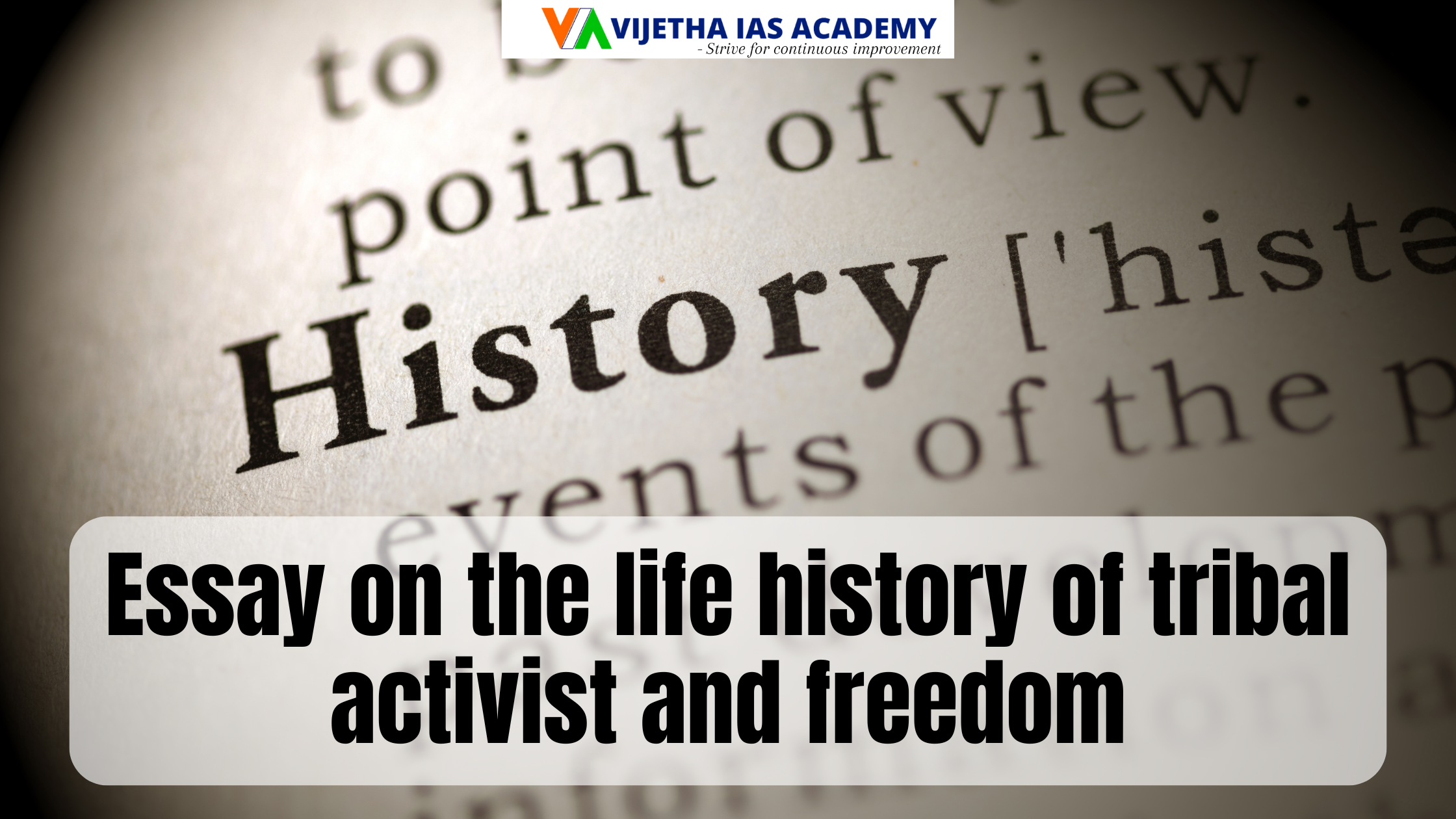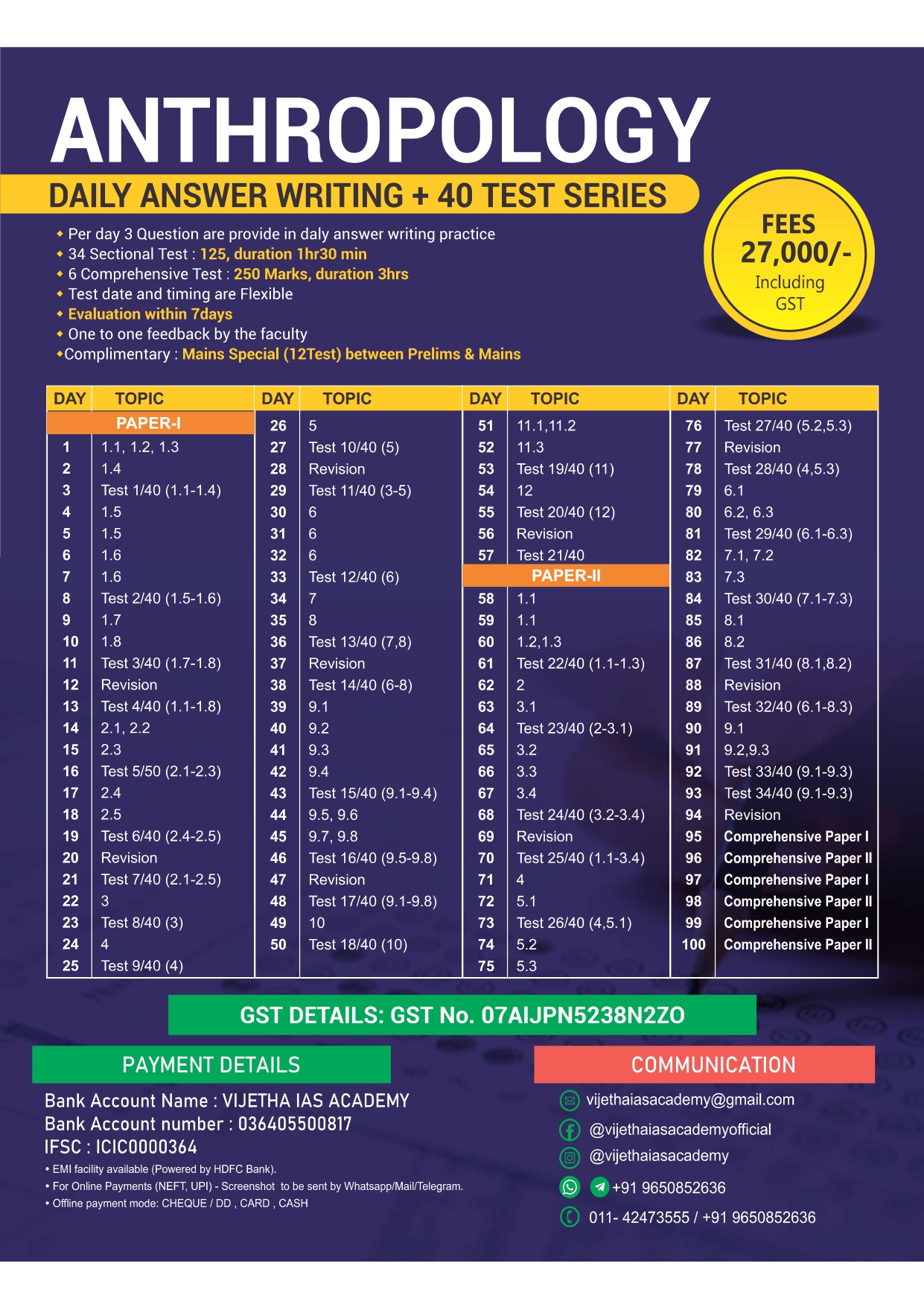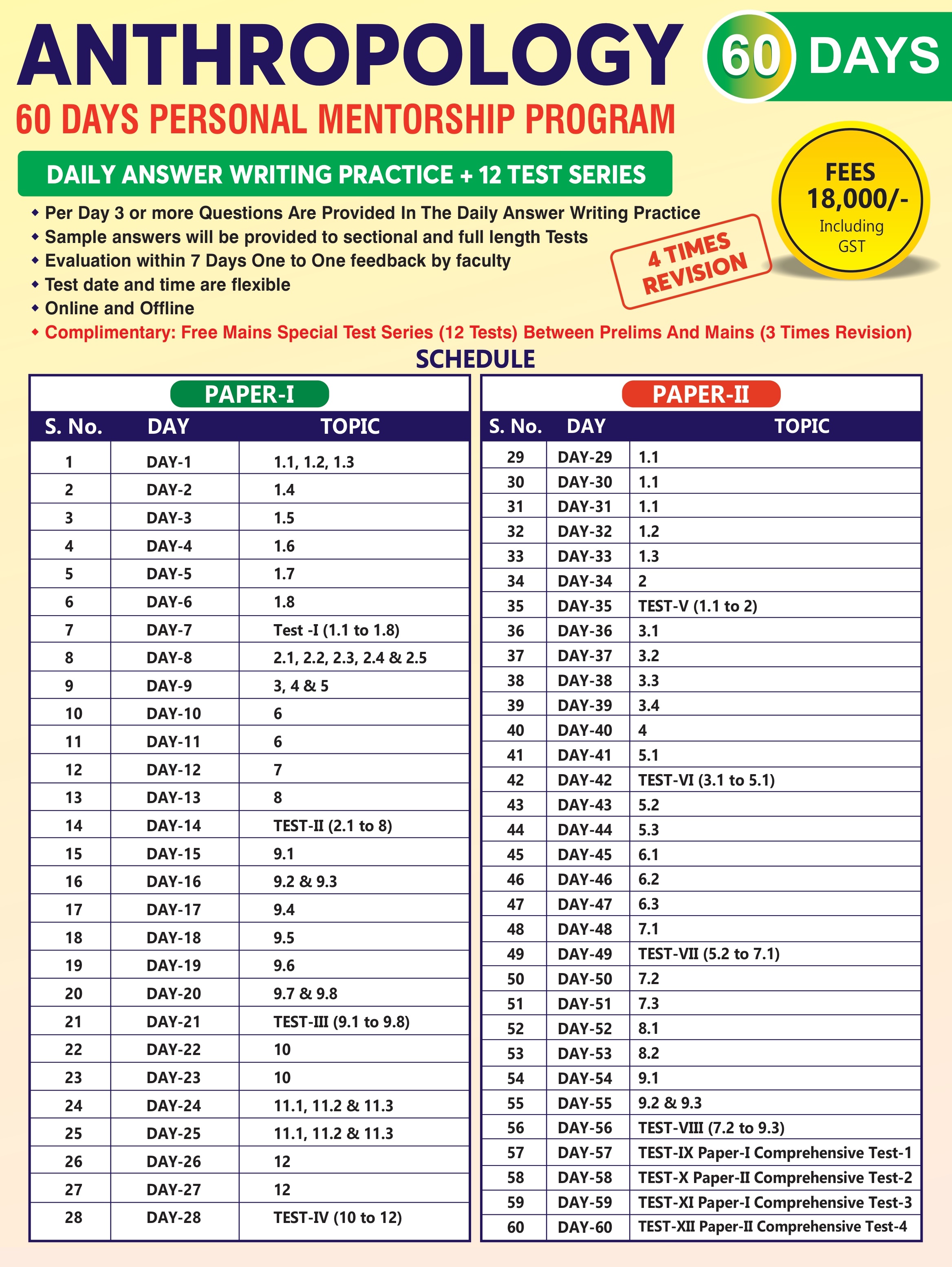Write an essay on the life history of tribal activist and freedom fighter Birsa Munda. What was the impact of his sacrifice on tribal society? Anthropology Optional Paper CSE 2024
Write an essay on the life history of tribal activist and freedom fighter Birsa Munda. What was the impact of his sacrifice on tribal society? Anthropology Optional Paper CSE 2024
-
Author : Vijetha IAS
-
Date : {{ formatDate("Wed Oct 02 2024 15:58:36 GMT+0530 (India Standard Time)") }}
-
Category : Daily article,

Write an essay on the life history of tribal activist and freedom fighter Birsa Munda. What was the impact of his sacrifice on tribal society?
(15 Marks) Anthropology Optional Paper CSE 2024
Introduction
Birsa Munda (1875-1900) was a legendary tribal leader and freedom fighter from the Munda tribe in present-day Jharkhand. His life and struggle against British colonial rule, missionary activities, and feudal exploitation marked a significant chapter in India's tribal resistance movement. Birsa Munda became a symbol of tribal identity, self-governance, and freedom, inspiring future generations of tribal communities to assert their rights and resist oppression. His legacy is celebrated not just for his role as a revolutionary leader but also for his vision of social and cultural upliftment of tribal society.
Main Body
Early Life and Background:
Birsa Munda was born on 15 November 1875 in Ulihatu village in what is now Jharkhand. He belonged to the Munda tribe, a prominent Adivasi community in the Chotanagpur plateau. His early life was shaped by poverty, colonial oppression, and exploitation by landlords (dikus), who had encroached on tribal lands with the support of British policies.
Birsa received an education at a missionary school, where he was introduced to Christianity, but he later rejected missionary influence and sought to revive tribal traditions and spirituality. His exposure to both tribal culture and colonial policies gave him a unique perspective on the challenges facing his people.
The Ulgulan (Great Tumult):
Birsa Munda is best known for leading the Ulgulan movement (meaning "great tumult" or rebellion) in the 1890s. The movement was aimed at resisting the British administration, feudal landlords, and the Christian missionaries who were converting tribal people and undermining their traditional belief systems.
Birsa envisioned the restoration of tribal land rights and the revival of indigenous religion. He called for the end of the feudal system that allowed landlords to exploit tribal labor and seize their land. His message of Munda Raj (Munda rule) and religious reform quickly gained momentum among the tribal communities of the region.
Birsa Munda claimed divine powers and became a spiritual leader for the Mundas. He inspired thousands to rise against the British and the landlords, leading to a series of armed confrontations between his followers and the British forces.
Arrest and Martyrdom:
In 1895, Birsa Munda was arrested by the British for his involvement in the Ulgulan movement. However, his influence continued to grow after his release, and by 1899, the movement had gained widespread support. The British, alarmed by the rising unrest, launched a crackdown, and Birsa was captured again in early 1900.
Birsa Munda died in British custody on 9 June 1900 under mysterious circumstances, believed to be due to ill-treatment or poisoning. Despite his short life, his sacrifice left a lasting impact on the tribal resistance movement and inspired future struggles for land rights and self-determination.
Impact of Birsa Munda’s Sacrifice on Tribal Society:
Restoration of Tribal Rights: Birsa’s movement resulted in the Chotanagpur Tenancy Act of 1908, which prohibited the transfer of tribal land to non-tribals. This law marked a significant victory for the tribal communities in the Chotanagpur region, safeguarding their land rights and protecting them from exploitation.
Awakening of Tribal Identity: Birsa Munda's leadership helped foster a sense of tribal unity and political consciousness among the Mundas and other Adivasi groups. His vision of Munda Raj inspired tribal communities to assert their cultural and political autonomy, leading to several subsequent movements for tribal rights in India.
Cultural Revival: Birsa emphasized the revival of traditional religious practices and the rejection of missionary influence. His movement sought to reassert tribal spiritual practices, which helped to preserve tribal identity in the face of external pressures.
Symbol of Resistance: Birsa Munda’s martyrdom turned him into a folk hero and symbol of resistance against British colonialism and feudal exploitation. His name continues to inspire tribal movements across India, especially in Jharkhand, Odisha, Chhattisgarh, and other tribal-dominated regions.
Birsa Munda’s Legacy:
Birsa Munda’s contribution is commemorated annually on Birsa Munda Jayanti (November 15), celebrated especially in tribal regions of India. He is revered as a freedom fighter, reformer, and martyr in India’s independence struggle.
In modern India, Birsa’s legacy lives on through the Birsa Munda University and the Birsa Institute of Technology in Jharkhand. The state of Jharkhand, formed in 2000, is often seen as a realization of Birsa Munda’s vision for the autonomy and upliftment of tribal communities.
Conclusion
Birsa Munda’s life and legacy represent a pivotal chapter in the history of tribal resistance and freedom struggle in India. His efforts to restore tribal lands, revive indigenous religion, and challenge British colonialism had a profound impact on the tribal communities of the Chotanagpur plateau and beyond. Though his life was short, his contributions laid the foundation for tribal rights movements in India, and his sacrifice continues to inspire the ongoing fight for justice, dignity, and self-governance among India’s tribal populations.
Anthropology Test Series Programme (Online + Offline))
We provide Anthropology Daily Answer Writing a range of programs designed to cater to various stages of UPSC preparation. Whether you're just starting out, have attempted the Mains before, or are getting ready for Mains 2024, we have the right option for you. Allow us to assist you in choosing the course that best fits your needs.
|
Level of Preparation |
Test Series Program |
Test Series Content |
Test Schedule |
|
Self-study of Anthropology Optional |
Anthropology 100 Days Personal Mentorship Program |
Daily answer writing, 34 sectional tests, 6 comprehensive tests, and complementary Mains Special 12 tests (between prelims and mains) |
|
|
Revise whole syllabus through Daily Answer Writing Practice and Tests |
Anthropology DAW Mentorship Program |
Daily Answer Writing Practice and 8 sectional and 4 Full Length tests |
|
|
Revise whole syllabus through Sectional and Full Length Tests |
Anthropology Tier- I T-40 Test Series |
34 Sectionals and 6 Full Length Tests |
|
|
Written Mains earlier and need more practice |
16-Anthropology Tier II Test Series |
10 sectional and 6 Full-Length Tests. |
|
|
Cleared Prelims 2023 and are preparing for Mains 2023 |
Mains Special 12 Tests program |
8 Sectional and 4 Full-Length Tests |
ANTHROPOLOGY MAINS SPECIAL COURSES
Enroll in our Anthropology Mentorship Program today and take the first step towards achieving your UPSC goals!
1) If you are going for Self study of Anthropology Optional and looking for a Comprehensive Program that includes Daily Answer Writing, 34 Sectional tests, 6 Comprehensive tests, and Complementary mains special 12 tests (between prelims and mains), our Anthropology 100 Days Personal Mentorship Program is the perfect choice.
2) If you want to revise Whole Syllabus through Daily Answer Writing Practice and 8 sectional and 4 full length tests, then our Anthropology DAW Mentorship Program is the best fit for you.
3) If you want to revise Whole Syllabus through 34 Sectionals and 6 Full Length Tests then Anthropology Tier- I T-40 Test Series is for you.
4) If you have written Mains earlier and need more practice, then our 16-Anthropology Tier II Test Series is a great option. This test series includes 10 sectional and 6 full-length tests.
5) if you have cleared Prelims 2023 and are preparing for Mains 2023,our Mains Special 12 Tests program is a must-have. This program includes 8 sectional and 4 full-length tests to help you prepare for the big day.
For more information on Vijetha IAS Academy’s Anthropology mentorship programs Deatils : https://vijethaiasacademy.com/anthropology-test-series
Anthropology 100 Days Personal Mentorship Program ( 7 + 3 Times Revision )

Anthropology 60 Days Personal Mentorship Program ( 4 + 3 Times Revision )

For more information: https://vijethaiasacademy.com/anthropology-test-series
Details Of Anthropology Classes Program
Top Anthropology Optional IAS Coaching Center in Delhi Vijetha IAS Academy | Best Anthropology Optional IAS Coaching in Delhi
Fee Structure:
- Tier 1: Rs. 55,150/- (3 Years Validity of Offline/Live Batch)
- Tier 2: Rs. 42,000/-
- Tier 3: Rs. 36,000/-
Batch Size: 50 – 60 Students
UPSC Notes
Anthropology Optional IAS Coaching Notes, IAS Exam Preparation Booklets, IAS optional coaching Notes, UPSC Coaching Notes, Video Lectures, Live Classes with faculty, Chat Facility Available
Teachers Name: N P Kishore Sir
Past Result
- Last Years Result 2023
- 35 Total Selections in CSE 2023
Google Reviews: 4.9 out of 5 stars
Website: Vijetha Anthropology Optional IAS Coaching in Delhi (https://vijethaiasacademy.com)
Faculties of Vijetha IAS Academy
- N P Kishore Sir
Features
- Vijetha IAS Academy offers Online and offline Courses for better preparation of Anthropology Optional Strategy for UPSC in Delhi.
- For better Anthropology optional Exam Preparation, Vijetha IAS Academy Delhi Conducts the Motivational IAS Session.
- Vijetha IAS Academy provides you with the CASE STUDIES on the pattern of the real-time IAS Exam which is helpful for better preparation of the Best Coaching for UPSC Anthropology Optional Optional IAS Examination.
- DAW & WAW – Revision Through Daily & Weekly Answer Writing Practice is offered by Vijetha IAS Academy for better result of the Anthropology Optional IAS examination.
Advantages of joining Vijetha IAS Academy
- Best Faculties for Anthropology Optional IAS Coaching in Delhi
- Best facilities, infrastructure and updated Case Studies Booklets and Notes for better preparation of the Anthropology Optional IAS Examination in Delhi.
- Best result in Past years for Anthropology Optional Strategy for UPSC Examination in Delhi
- Best Rated coaching institute for Anthropology Optional IAS Examination in Delhi.
- Vijetha IAS Academy also provides recorded lectures videos, notes which is very helpful for better preparation of Anthropology Optional IAS Coaching in Delhi
Fees Structure of Vijetha IAS Academy
|
Tier 2 |
Tier 1 |
Tier 3 |
BATCH STARTS FROM |
|
42,000/- |
55,150/- (3 Years Validity Offline/Live Batch) |
36,000/- |
REGISTRATION – START |
Fees Structure of Vijetha IAS Academy
|
Course Name |
Fees Amount |
Course Duration |
|
GS Offline (Pre + Mains+ CSAT) with Essay+Answer Writing |
Rs.99,000 (Including GST) |
400+ Days |
|
GS Online |
Rs.18,999 (Including GST) |
400+ Days |
|
GS Mentorship Programme |
Rs.29,999 (Including GST) |
1 Year |
For more information on our courses, visit our Anthropology Courses page. Explore our Test Series and Online Courses for flexible learning options.
Vijetha IAS Academy
Add. 2nd Floor, 50, Shankar Road, Block 7, Old Rajinder Nagar, Rajinder Nagar, New Delhi, Delhi 110060
MOB. 096508 52636
Open 7 Am: Closes 9 PM
Keywords: Synergistic Effects of Biological and Cultural Factors in Human Evolution , anthropology 2024 question paper, Anthropology optional subject question paper 2024, Anthropology optional 2024 question paper, Anthropology Optional Coaching UPSC, Vijetha IAS Academy Anthropology, Anthropology crash course UPSC, Anthropology daily answer writing UPSC, Kishore sir Anthropology
-1647944223018.png)